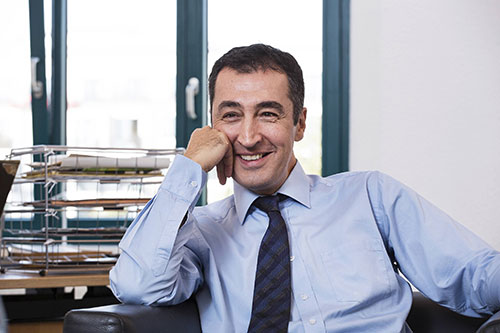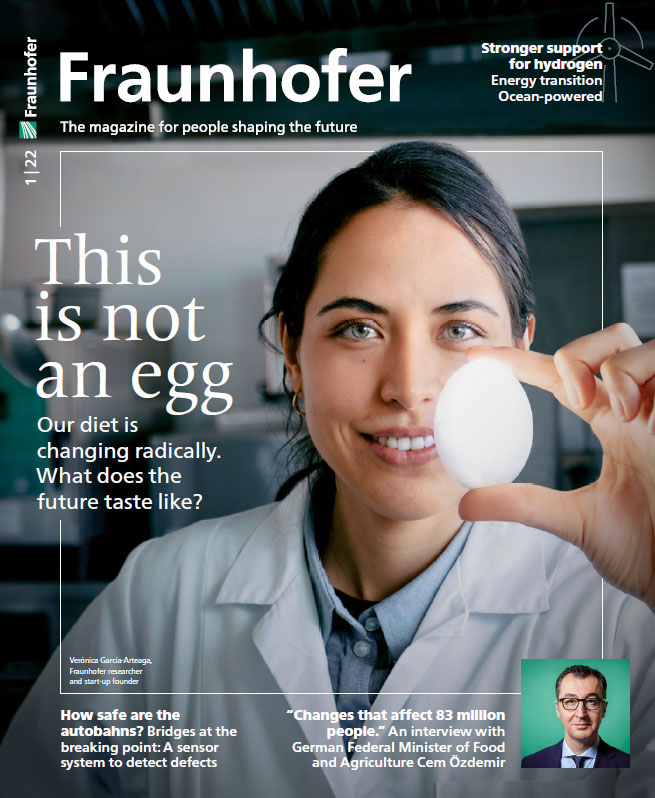What plans are in place here?
We want to increase transparency in terms of food origin at a European level. Consumers want to know where their food comes from — and our domestic farmers will be at an advantage there. If a product is advertised on a supermarket flyer based on its origin rather than a discounted price, everyone benefits. After all, this is also about appreciating our farmers. An important aspect for me is that origin identification also makes transport routes visible, which contributes to climate friendly consumption.
The German Federal Statistical Office has recorded a reduction in meat consumption for the fifth year in a row, with the number of pigs slaughtered falling by 2.9 percent to 51.8 million in 2021. Would you still advise a young person today to take over their parents’ farm?
The number of animals going to the butchers is just one side of the coin; there’s also a flip-side. Over the past ten years, the number of pig farms has almost halved, but the number of pigs is nearly the same as before. We are in the midst of a process that concentrates production into a smaller number of farms that are ever increasing in size. Many family-run farms can’t contend with these. From each euro that a customer pays for meat at the checkout, the farmers receive a mere 21 cents. This is the result of a one-sided agricultural policy, and I’m not willing to let this exploitative system continue. We want to offer the farms a future that is both ecologically and economically sustainable so that young people are keen to take over family farms and they have the chance to make a living. This is also connected to a greater social goal: Wherever there are farmers, they work in, and for the good of, the countryside. This holds together communities and fosters rural culture.
You were initially tipped as Minister of Transport, or Foreign Affairs due to your family heritage. You are now the Minister of Agriculture. What are your ties with the proud people of the farming community?
In political terms, I haven’t actually worked this field before. My father’s parents were farmers in Turkey and I always went there on summer vacation. Now things have come full circle, in a way. Above all else, serving our country as Federal Minister of Agriculture is a huge honor. Naturally, I was delighted that my party entrusted me with this important portfolio. I now have the opportunity to work together with my colleagues to plan and drive important changes that will ultimately affect 83 million people. For me, it’s important that we tackle these tasks together and put an end to the sense of one group working against another. To answer your question, I think farmers can rightly be proud of their work, and we should be too. I have also witnessed a high level of innovation in the sector as well as a certain perseverance, which has earned my deep respect. Being honest and talking about what is effective and what we need to change is important to me. For far too long, farmers were told there were no problems — for instance regarding high nitrate levels resulting from overfertilization, an issue on which the EU has been calling for improvements for years and where we have recently only just averted massive fines.
Your call for an end to “junk prices” for food has naturally provoked some angry responses. Is this your recipe for the future: less, but more expensive?
That version is too simplified — my recipe has more ingredients than that. First of all, farmers in Germany must be able to make a living. Secondly, what we spend on food must factor in the ecological truth, that is, the costs for people, animals and the environment. And thirdly, we require food that is high-quality, but still affordable. I want shape these three goals into one interconnected whole. We clearly need to restore the balance between the number of animals and the space they have. And it’s also important that farmers do not lose out as a result of this transformation. If they make improvements to their livestock farming practices, it must pay off in the long term. The responsibility for this must be shared jointly by politics, the food industry, commerce and consumers.
“For my mother, giving candy to her child was a sign of love,” you once said. Drawing on your background in education, Mr. Özdemir, how long do you think it will take to make healthier, more environmentally friendly nutrition part of everyday life?
When love and calories go hand in hand, there’s going to be a big, fat shock at some point — in the most literal sense of the word. It’s obviously good that the issue of healthy and sustainable nutrition is now so topical — there’s definitely been a shift here. However, it is not always easy for consumers to figure out what food is actually healthy and whether it was produced in a way that conserves resources. For this reason, our coalition has decided to develop the Nutri- Score labeling scheme further. I’m referring to the five-color nutritional value rating label found on a lot of food packaging. We need a uniform solution for this at the European level. Plus, as already mentioned, we are working on livestock farming identification and origin identification.
This also brings us to the issue of demand that you talked about earlier…
Exactly. We want to ensure that food is produced in a healthier, more humane and sustainable manner and naturally, we also want to make it easier for consumers to be able to recognize this from packaging. This labeling system will definitely provide the right support to help consumers make animal-friendly and eco-friendly choices.
What do you expect from the dual-use initiatives for arable land that involve constructing solar panels over it?
Our goal is to drive the expansion of renewable energy production. With agrivoltaics, it’s a win-win-win situation. Our farmers can contribute to the renewable energy supply while earning money. Simultaneously, they can still use the land underneath the panels for agricultural activities. And finally, this also represents an important contribution to combating the climate crisis.
There are still some obstacles, however. The dual use of arable land is simply not yet provided for by law, so farmers cannot claim EU agricultural grants and electricity feed-in remuneration is unregulated. How do you plan on overcoming these hurdles?
We are aiming to take advantage of the synergies to enable both food and sustainable energy to be produced using the same area of land. That’s why the new regulations for agricultural support funding will allow this kind of land to be considered for direct payments from the EU from 2023 onward. These dual systems will also be funded in accordance with the German Renewable Energy Sources Act (Erneuerbare-Energien-Gesetz, EEG).
How can research help combine economic and ecological factors in agriculture?
Our ministry has the fourth-largest research budget of all departments, and our subordinate agencies are also conducting research in this area. Combining economic and ecological factors is the only way of ensuring a positive future for agriculture in Germany. Research and innovation can help resolve any ostensible conflicts of interests.
Could you give us some examples?
Digitalization in agriculture is one particular example I’m thinking of. It offers almost endless possibilities for making agriculture more environmentally friendly and resource-efficient. For instance, we are currently providing funding for ConstellR — a startup that measures soil health from space using its own satellite fleet. This Fraunhofer spin-off aims to enable high-precision, and thus more sustainable farming in our fields. There are also technologies that significantly reduce pesticide use or even make it unnecessary, such as robots that target weeds using AI-driven image recognition and remove them mechanically using heat, lasers or electricity. This allows us to protect biodiversity, too. There are many other examples of similar measures. At any rate, agriculture is more modern, digital and technologically advanced than people think.
“As a teenager”, you once confessed, “I shattered my parents’ dreams.” What would your parents be proud of today?
Well, as an environmentally conscious vegetarian who listened to rock music, wore ripped jeans and studied child care, I didn’t always conform to their ideal image of a son. But my parents were always proud of me and supported me. I think they would be especially proud of the fact that I’m now a federal minister. It would certainly have been hard to predict my path here.

